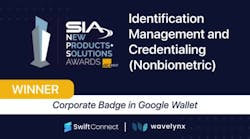GAINES TOWNSHIP - The way Sherri Reed sees it, using the security system at her daughter's school is a lot like getting a vaccination.
It's not a lot of fun, but the protection is worth the pain.
Reed said she "complained and whined" when the tabletop security computer known as LobbyGuard was installed at her daughter Hannah's charter school, Cross Creek Academy in Gaines Township, earlier this year.
"I hate modern technology. I'm not a computer person, and I don't like change," she said. "But I tried it, and it was one of the easiest things I've done."
The device scans a visitor's driver's license to quickly let school personnel know if the visitor is on the national sex offender list. It also snaps a picture. Those who pass the screening get a sticker to wear bearing their name and photo, as well as the date and time they arrived.
Schools also may program LobbyGuard to notify them of parents or others who aren't supposed to have contact with certain children.
When a noncustodial dad who wasn't permitted to pick up his children entered Cross Creek last spring, LobbyGuard immediately sent an e-mail to office personnel and to Principal Joe Nieuwkoop's phone and computer.
Officials discreetly denied him access, said Jeff Reinke, director of information technology services for National Heritage Academies, which manages Cross Creek and 54 charter schools nationwide.
NHA has installed LobbyGuard in all its schools, Reinke said. While the system is popular on the East Coast, NHA schools are the only ones in Michigan using it.
"It offers some very good opportunities for school districts to better screen visitors," said Larry Johnson, executive director for safety and security for Grand Rapids Public Schools.
While Grand Rapids doesn't have a similar system, Johnson is looking at what is available and hopes to test one in a couple of schools using grant money earmarked for student safety, he said.
"There are probably dozens of different solutions out there, and we need to make sure we get the most for our dollars," Johnson said.
Each LobbyGuard machine retails for $10,000, but schools can buy them for $6,000 each, LobbyGuard's Web site said. NHA refused to say how much it paid for its 55 machines.
LobbyGuard, based in Raleigh, N.C., is a division of Pitney Bowes, a company that helps organizations manage technology. Schools are its biggest client, but the "visitor management system" also is used in corporate offices, hospitals and government buildings, LobbyGuard President Kevin Allen said.
The machines can be programmed to allow visitors without a driver's license to type in their name and birth date for an ID badge. They also can skip the sex-offender check if a business doesn't deem it necessary.
Also, LobbyGuard doesn't check for felony convictions because there is no national database and because some states put a limit on the type of background check that can be done on someone who is simply visiting a building, Allen said.
NHA bought the devices as a way to be "proactive on security," not because the schools had specific security issues, said Jason Rottman, NHA systems administrator. The old system of signing a log book and printing your name on a visitor's badge "had no checks whatsoever," Nieuwkoop said.
At Cross Creek, LobbyGuard has tallied a couple of "false positives," Nieuwkoop said, mistakenly identifying people with similar names as sex offenders in other states. Those errors were immediately addressed and parents were allowed access, he said.
Since they were installed in January and February, the machines have not identified a sex offender attempting to gain entry into an NHA school, Rottman said.


